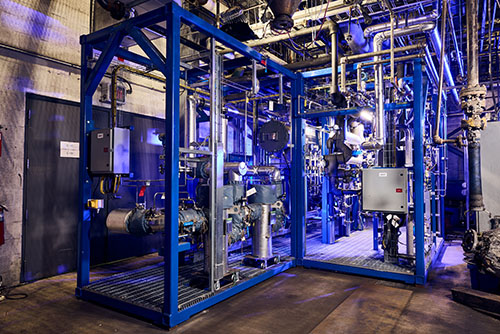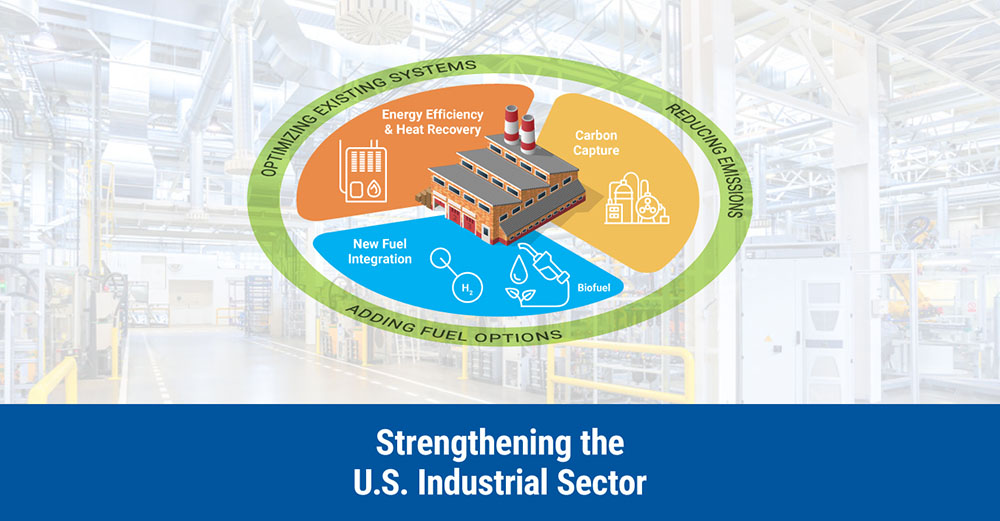Advancing Innovative Technologies to Reduce Industrial Emissions
 The industrial sector is experiencing a surge of interest in improving energy efficiency, modernizing operations, and reducing environmental impact. As manufacturers and developers seek new solutions to their goals, GTI Energy is leveraging deep expertise and strong public and private sector partnerships to be at the forefront of the solution.
The industrial sector is experiencing a surge of interest in improving energy efficiency, modernizing operations, and reducing environmental impact. As manufacturers and developers seek new solutions to their goals, GTI Energy is leveraging deep expertise and strong public and private sector partnerships to be at the forefront of the solution.
GTI Energy collaborates closely with the U.S. Department of Energy (DOE) and countless partners on a broad portfolio of solutions to shape the future of industrial emissions reductions. In addition to the DOE, these projects include critical support from Utilization Technology Development (UTD) NFP, and other utility partners.
From integration of low-emission fuels like hydrogen and biomass, to equipment optimization in residential and commercial spaces, to proven technologies like carbon capture and storage in iron and steel manufacturing, GTI Energy is involved in many efforts to meet the demands of the industrial sector without sacrificing reliability or affordability of its energy sources and systems.
By leveraging federal funding and strong collaboration, our projects are contributing to thriving local economies, creating jobs, and improving air quality.

Project Highlight:
Optimizing Efficient Energy Use in High-Temperature Heat Exchangers
With DOE support, GTI Energy and partners Bloom Engineering Company and PRE-Heat Inc. have been selected for a DOE award to design, build, and demonstrate a high-temperature radiative heat exchanger with secondary emitters (RESE) that recovers heat to preheat combustion air, enabling utilization in many high-temperature processes. Demonstrating advancements in materials-based modeling, the technology will save energy, cut costs, and reduce emissions while improving efficient energy use in industrial systems across sectors. Utilization Technology Development, NFP (UTD) will also provide funding to support the initiative.
Project Highlight:
Decarbonizing the Steel and Aluminum Sector with a Fuel-Flexible Burner
To reduce the carbon footprint of energy-intensive industries, GTI Energy is leading a team of partners, including Bloom Engineering, Oak Ridge National Laboratory, Argonne National Laboratory, and Finkl Steel, in a DOE project to develop an advanced regenerative burner system that can be easily retrofitted into existing fossil fuel-fired furnaces. The high-efficiency, ultra-low emission, fuel-flexible burner will allow the industrial furnaces to use low- and zero-carbon fuels like hydrogen and other liquid renewable biofuels. UTD is providing financial support to advance the technology.
Project Highlight:
Developing a Fuel-Flexible Combustion System for Industrial Furnaces
In a project funded by DOE and supported by UTD, GTI Energy and partners Honeywell Thermal Solutions, Georgia Institute of Technology, Bright Sensors SA, and Argonne National Laboratory will design and demonstrate an adaptable combustion system for use in industrial furnace applications. Known as an omnivore combustion system (OCS), the intent of the project is to demonstrate that the fuel-flexible combustion system can accommodate a wide range of alternative fuels, including natural gas-hydrogen blends, syngas, and biogas, while maintaining ultra-low nitrous oxide (NOx) emissions. The project will focus on improving performance, operational stability and safety, and fuel flexibility.
Project Highlight:
Enabling More Efficient Industrial Heating with an Electric Reformer
GTI Energy will lead a team to accelerate high-impact equipment and component innovations to decarbonize industrial thermal heat processes in a DOE-funded project. GTI Energy, Siemens Energy, and other partners will demonstrate a novel inductively heated chemical reactor for high-temperature, endothermic industrial hydrogen and syngas production. GTI will design, model, and optimize this commercial-scale reactor for the electrified conversion of waste carbon dioxide via the reverse water-gas shift reaction. The technology is expected to demonstrate a significant cost reduction, an 85% greenhouse gas emission reduction, and a considerable size reduction compared to current equipment.
Project Highlight:
Validating and Demonstrating Zero-Emissions Hydrogen Heat and Power Technology
GTI Energy's researchers are part of a team led by Noble Thermodynamic Systems, Inc. focused on accelerating the commercial readiness of low-carbon input and flexible combined heat and power (CHP) technology. The team will validate and demonstrate Noble's Argon Power Cycle (APC) to enable efficient and low-cost carbon capture from alternative fuels. This technology promises to increase the efficiency of CHP generation systems, reduce NOx emissions, and increase electricity generation efficiency. Technology advancement is being supported by UTD.
Project Highlight:
Developing an Advanced Infrared Hydrogen Fuel Flexible Boiler for the Food and Beverage Industry
In a DOE project led by West Virginia University, GTI Energy is partnering with Oak Ridge National Laboratory to develop a fuel-flexible boiler capable of utilizing alternative fuels such as hydrogen, natural gas, biogas, and other manufactured gases. The industrial boiler will be designed to produce hot water and steam for food/beverage process heating needs, which is one of the largest energy consuming and GHG-emitting industries in the United States. UTD is providing financial support to the project.
Project Highlight:
Advancing Absorption Heat Pump Wood Dryer Technology for Forest Products
In a project to develop and field test a potentially zero-carbon, energy efficient drying technique for lumber production, GTI Energy is working with project lead Micro Nano Technologies, University of Florida, and other partners with the support of DOE to design and manufacture a full-scale absorption heat pump, incorporating innovations that address the cost, size, efficiency, and operational limitations of current absorption technology. When combined with a zero-carbon source of heat such as geothermal or concentrated solar power, absorption heat pumps offer a pathway to eliminate greenhouse gas emissions in industrial drying processes. UTD is providing financial support to advance the technology.
Project Highlight:
Optimizing a High-Temperature Heat Pump System
Innovations in industrial heat pump technology can lead to energy and emissions reductions across multiple industrial sectors. On a Purdue University-led project, GTI Energy is working with a slate of other partners on a heat pump system with internally cooled screw compressor to increase the temperature at which industrial heat pumps can provide heat. It is expected to be a highly efficient combustion alternative that provides low-emission heat when using clean sources of energy.
Additional Projects:
- Development of ROTA-CAP™ Intensified Carbon Capture System
- Reducing the Cost and Energy Penalties of Carbon Capture with Facilitated Transport Membrane (FTM) Technology
- Leveraging the Versatility of Hydrogen to Decarbonize California’s Large Commercial and Industrial Facilities
- Demonstrating Commercial Foodservice Cooking Performance Using Low-Carbon Hydrogen/Natural Gas Blends
Learn More
Contact the energy experts today
